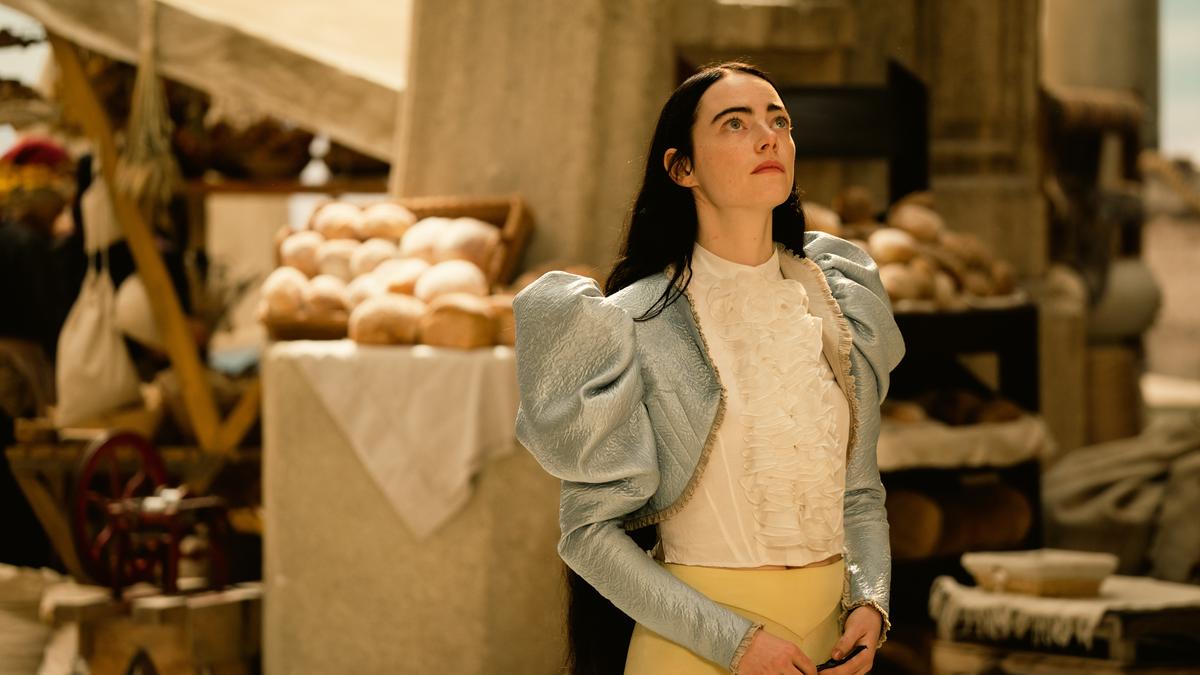
28 December 1895. The brothers Auguste and Louis Lumière breathe life to the art of cinema. The Arrival of the Train at La Ciotat station, a film of about 40 seconds, spreads panic among the spectators of the first public, ticketed screening of a film (a train, a real train is coming towards us!). Among the viewers, Georges Méliès is the first to realize the magical effect of film storytelling on people. From then on, the straight line that connects all the significant filmmakers is their attempt to discover the possibilities of cinema each time from the beginning, like children just starting to sense the world, nature, and people.
Produced on a budget much bigger than his Greek-language films, Yorgos Lanthimos‘ Poor Things seems, like its heroine, to be discovering the world from scratch. In this way, it should come as no surprise that, by the filmmakers’ own admission, the rehearsals encouraged liberation and playfulness. All of these are precisely the elements that all artists aim for under ideal circumstances – especially in our times, where self-censorship and seriousness lurk. In Poor Things, not only will one not encounter elements of seriousness, but one will instead find moments inspired by the craziest dreams of Jean Vigo, Mel Brooks, the great surrealist Luis Bunuel, and even Rainer Werner Fassbinder (the color palette in Hanna Schygulla’s sequence on the deck).
Bella Baxter (Emma Stone) is the creation of Godwin Baxter (Willem Dafoe). God, who is in love with his science (the connotations of the names in this story also all feel like we’re in a real-life fairy tale), retrieves the body of a beauty who committed suicide, revives her, and moreover gives her the brain of the fetus she was carrying. A story drawn from the bowels of the eponymous book, written by Alasdair Gray, and a thrilling screenplay adaptation by Tony McNamara that allows the book’s political references to act more as the background, bringing to the fore a series of bizarre, complex characters and of course Bella’s journey towards emancipation.
Like all great works of art, Yorgos Lanthimos’ film never becomes didactic but instead employs the important instruments he brought to his craft from the beginning of his cinematic career: irony, black humor, and horror. On a first level, Poor Things is a hilarious comedy. Not only during the moments of Bella’s childlike reactions at the beginning of the film, but also during her wanderings, her dialogues with the rogue lover played by Mark Ruffalo, and Godwin’s harsh observations about his own nature. Tony McNamara has turned a challenging book into a screenplay that on the one hand serves to highlight the costumes, set designs, color palette, but most importantly, Lanthimos’ wide-angle lens. Concurrently, McNamara writes episodes that were not present in Gray’s novel or expands on original ones by imbuing them with poignant dialogue. It is indeed through the utilization of dialogue, through the sharp, oblique look at the situations, that the film’s stance towards the male gaze and in favor of a heroine on her way to self-consciousness emerges.
This Aristotelian heroine, unique by the standards of Yorgos Lanthimos’ oeuvre so far, is portrayed by Emma Stone with a bravery that is rarely seen in contemporary screen performances (either by male or female actors/actresses). Yorgos Lanthimos creates this playful atmosphere between the actors with the main purpose of Emma Stone opening up, testing her limits, making choices, getting in touch with Bella’s sexuality. With the constant support of his screenwriter, Lanthimos allows Mark Ruffalo to balance a character who is torn between the comedy of Oscar Wilde (The Importance of Being Earnest, which is also mentioned in a line of dialogue in the film) and the farce of Georges Feydeau. The result is a character that is both attractive and repulsive to the spectatorship.
When it comes to Willem Dafoe, just a few words are not enough. He doesn’t accept not even for a single second to caricature his character, sympathizes with him as much as he can, and gives him breathing room under his makeup mask. I cannot recall in recent cinematic moments, a scene with an actor portraying a dying person and the combination of filming and acting making the viewer feel in the movie theater – like that first spectator in Paris – the soul of the dying person slowly rising, fluttering, and going on its way up to the ethers…
A true masterpiece and a Greek director who can now only be compared to the most brilliant auteurs in the history of cinema.